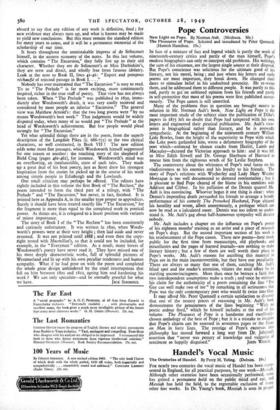Pope Controversies
New Light on Pope. By Norman Ault. (Methuen. 30s.)
The Pleasures of Pope. Selected and introduced by Peter Quennell. (Hamish Hamilton. 15s.)
IN face of a mixture of fact and legend which is partly the work of nineteenth-century critics and partly of the man himself, Pope's modern biographers can only re-interpret old problems. His writings, the sum of his existence, are the largest single source at their disposal. But Pope's conscience was solicitous for the ultimate good of his literary, not his moral, being; just where his letters and early poems are most important, they break down. He changed their dates to stimulate belief in his undoubted precocity. He re-wrote them, and he addressed them to different people. It was partly to this end, partly to get an unbiased opinion from his friends and partly in self-protection that most of his poems were first published anony- mously. The Pope canon is still unsealed.
Many of the problems thus in question are brought nearer to solution in Mr. Norman Ault's book. New Light on Pope is the most important study of the subject since the publication of Dilke's papers in 1875 left no doubt that Pope had tampered with his own letters and engineered their piratical publication. Mr. Ault's view- point is biographical rather than literary, and he is avowedly sympathetic. At the beginning of the nineteenth century William Lisle Bowles, from the height of the superiority to Pope with which the Lake poets garlanded him wrote a defamatory biography of the poet which—enforced by chance cracks from Hazlitt, Lamb and Macaulay—dictated the Victorian approach to him: and it was left to Miss Edith Sitwell and Dr. George Sherburn of Harvard to rescue him from the righteous wrath of Sir Leslie Stephen.
The controversy about the whiteness of Pope's soul turns on his vindictiveness to his enemies and his loyalty to his friends. The story of Pope's relations with Wycherley and Lady Mary Wonky Montague is too well documented to demand reorientation ; but it is pleasant to find Pope cleared of the blame in his enmities with Addison and Cibber. In his palliation of the Dennis quarrel Mr. Ault is less convincing. Whoever began it one thing is clear: when Dennis's impending death persuaded his friends to arrange a benefit performance of his comedy The Provoked Husband, Pope abjured his hostility and wrote, albeit anonymously, a prologue which can now be read as a Calculated sneer. Dennis was too infirm to under- stand it. Mr. Ault's gag about half-humorous sympathy will deceive nobody.
Mr. Ault includes a chapter on the influence on Pope's poetry of his eighteen months' training as an artist and a piece of research on Pope's dogs. But the second important section of his work is his reinforcement of the Pope canon. These new poems—here nude public for the first time from manuscripts, old playbooks and miscellanies and the pages of learned journals—are nothing to make literary history ; but a few of them are well worth their place in Pope's works. Mr. Ault's reasons for ascribing this material to Pope are in the main incontrovertible, but they have one peculiarity. There are always so many that one of them, catching Mr. Ault') blind spot and the reader's attention, vitiates the total effect by its startling unconvincingness. More than once he betrays a faith that two interdependent assumptions make a truth ; and -once he enforce his claim for the authenticity of a poem containing the line " For Gay can well make two of me" by remarking in all seriousness that Pope was the only contemporary poet who would fit twice into Gay. It may afford Mr. Peter Quennell a certain satisfaction to discover that one of the neatest pieces of reasoning in Mr. Ault's book demonstrates the genuineness of the lines beginning " With no poetic ardour fired," which he himself includes at the end of hi) volume. The Pleasures of Pope is a handsome and excellently- chosen anthology of the best of Pope ; but it is a mistake to imaginc that Pope's charm can be assessed in seventeen pages or the Essay on Man in forty lines. The prestige of Pope's excursus into philosophy has moved forward a long way from Dr. Johnson) assertion that "never was penury of knowledge and vulgarity of sentiment so happily disguised." JOHN WHALE.






































 Previous page
Previous page